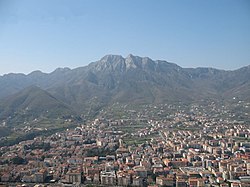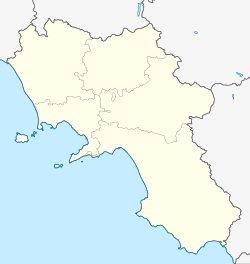Cava_de'_Tirreni
Cava de' Tirreni
Comune in Campania, Italy
Cava de' Tirreni (Italian: [ˈkaːva de tirˈrɛːni]; Cilentan: A Càva) is a city and comune in the region of Campania, Italy, in the province of Salerno, 10 kilometres (6 miles) northwest of the town of Salerno. It lies in a richly cultivated valley surrounded by wooded hills, and is a popular tourist resort.[3] The abbey of La Trinità della Cava is located there.
This article includes a list of general references, but it lacks sufficient corresponding inline citations. (March 2011) |
You can help expand this article with text translated from the corresponding article in Italian. (January 2022) Click [show] for important translation instructions.
|






